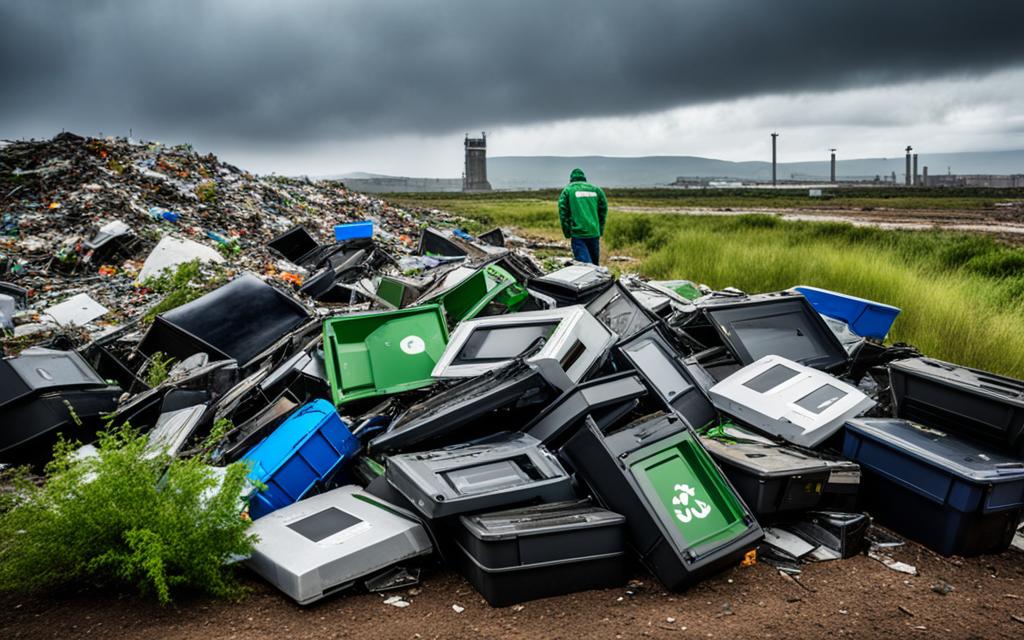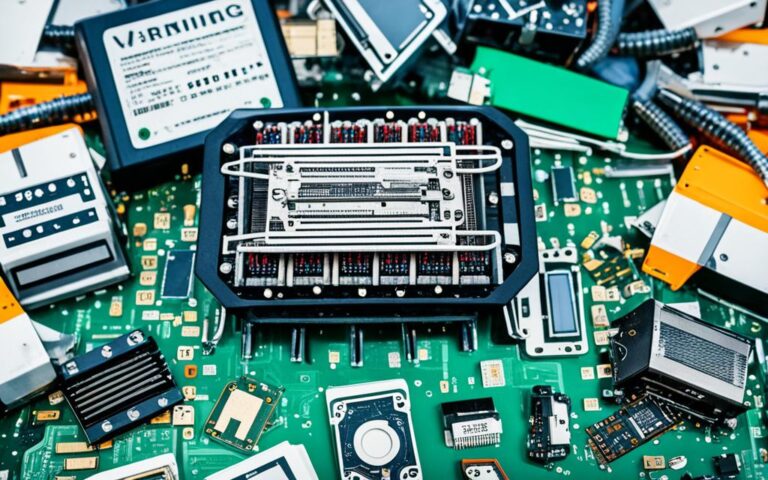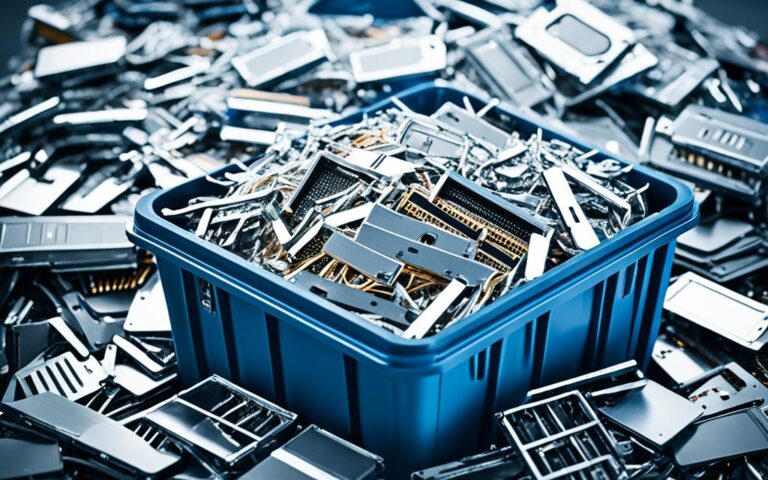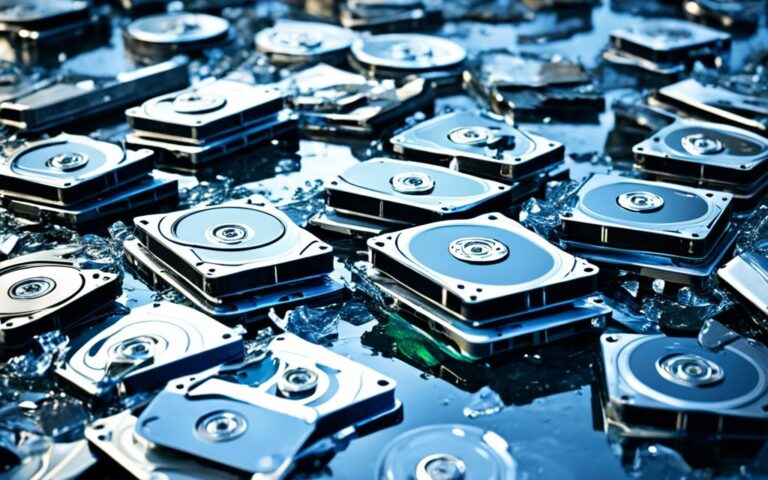The Environmental Benefits of Responsible Electronic Waste Management
E-waste, or electronic waste, is the fastest-growing waste stream globally. When e-waste ends up in landfills, it can release toxic materials like lead, mercury, and cadmium, which harm ecosystems and human health. However, responsible e-waste recycling can offer significant environmental benefits. It reduces reliance on virgin materials by recovering valuable resources like gold, silver, and copper. Recycling e-waste also combats climate change by reducing energy consumption and greenhouse gas emissions. Furthermore, it prevents air and water pollution and conserves valuable landfill space. The e-waste recycling industry also generates employment opportunities, contributing to a sustainable economy. Building a circular economy through e-waste recycling is essential for a more sustainable future.
The Power of E-waste Recycling
Recycling e-waste has numerous environmental benefits, making it a powerful solution to address the growing electronic waste problem. By recycling electronic devices, we can reduce our reliance on virgin materials such as gold, silver, and copper, which have a significant environmental impact during mining and extraction processes.
By conserving these valuable resources through e-waste recycling, we can minimize the need for further extraction and contribute to a more sustainable future.
Another significant advantage of e-waste recycling is its contribution to combating climate change. The manufacturing of new electronics requires a substantial amount of energy, but recycling e-waste significantly reduces the energy needed for production. By opting for recycling, we can reduce energy consumption and greenhouse gas emissions, helping to mitigate the effects of climate change.
Recycling e-waste plays a crucial role in preventing air and water pollution as well. Improper disposal of electronic devices can result in the release of harmful toxins into the environment. However, through proper e-waste recycling processes, we can prevent these toxins from damaging our air and water, protecting both the environment and human health.
Furthermore, e-waste recycling helps conserve precious landfill space. With the volume of electronic waste continuing to rise each year, landfills are becoming overwhelmed. By diverting e-waste from landfills through recycling, we can extend the lifespan of these facilities and preserve land for future generations.
E-waste recycling also creates numerous green jobs, providing employment opportunities in various sectors. From collection and sorting to dismantling and processing, the e-waste recycling industry contributes to a sustainable economy.
Moreover, e-waste recycling is an integral part of building a circular economy. Instead of a linear model of production and disposal, a circular economy aims to keep resources in use for as long as possible and minimize waste. By recycling e-waste, we close the loop and ensure that valuable materials are repurposed and put back into the production cycle.
“E-waste recycling is not only an environmentally responsible practice but also a catalyst for building a sustainable future. Through reducing reliance on virgin materials, combating climate change, preventing pollution, conserving landfill space, creating green jobs, and fostering a circular economy, recycling e-waste has the power to transform our world for the better.”
To further illustrate the environmental benefits of e-waste recycling, let’s take a look at the following table:
| Environmental Benefits | Brief Description |
|---|---|
| Reduces reliance on virgin materials | Recovering valuable resources like gold, silver, and copper |
| Combats climate change | By reducing energy consumption and greenhouse gas emissions |
| Prevents air and water pollution | By proper disposal of electronic devices and preventing toxins release |
| Conserves precious landfill space | Diverting e-waste from overflowing landfills |
| Creates green jobs | Employment opportunities in the e-waste recycling industry |
| Builds a circular economy | Ensuring resources are kept in use and waste is minimized |
With these compelling environmental benefits, it is clear that e-waste recycling is a powerful solution to mitigate the environmental impact of electronic waste and pave the way towards a more sustainable and circular future.
The Environmental Impact of Improper E-waste Disposal
Improper disposal of e-waste has severe environmental impacts. The materials used in electronic devices, such as lead and mercury, can poison the soil if not properly managed. When e-waste is exposed to heat, toxic chemicals are released into the air, contributing to air pollution. These toxins can seep into groundwater, affecting both land and sea animals. Studies have even indicated a link between e-waste in landfills and respiratory issues in humans.
“The improper disposal of electronic waste poses a significant threat to our environment. When e-waste is discarded in landfills or incinerated, it releases toxic substances that can contaminate the environment and harm both flora and fauna. Proper management and recycling of e-waste are essential to mitigate these hazardous consequences and protect our natural resources.” – Dr. Rebecca Andrews, Environmental Scientist
The volume of e-waste generated each year is also a significant challenge, with millions of tons being produced globally. Currently, only a small percentage of e-waste is recycled, leading to the need for increased recycling efforts to prevent environmental pollution and conserve resources. Proper disposal and recycling of e-waste are crucial to minimize its detrimental impact on ecosystems and human health.
| Environmental Impacts of Improper E-waste Disposal |
|---|
| E-waste contaminates soil and groundwater with toxic substances |
| Toxic chemicals are released into the air, contributing to air pollution |
| Land and sea animals are affected by the seepage of toxic substances |
| Studies indicate a link between e-waste in landfills and respiratory issues in humans |
| Rising volumes of e-waste pose significant challenges |
It is imperative that individuals, businesses, and governments take responsibility for the proper disposal and recycling of e-waste to mitigate its environmental impact and safeguard the health of our planet.
The Cost and Regulatory Benefits of E-waste Recycling
E-waste recycling offers both cost and regulatory benefits for businesses. With stricter regulations on e-waste disposal, businesses that implement e-waste recycling practices can stay ahead of compliance requirements and avoid potential fines and legal repercussions. Demonstrating adherence to environmental regulations enhances a company’s reputation as an environmentally responsible entity.
In terms of cost savings, traditional waste management methods for electronic devices can be expensive, especially when considering potential fines and the expenses associated with secure data destruction. However, e-waste recycling eliminates these costs and can even generate revenue through the recovery and sale of valuable materials. Working with a trusted e-waste recycling provider allows businesses to optimize operational costs while fulfilling their sustainability goals.
| Cost Benefits of E-waste Recycling | Regulatory Benefits of E-waste Recycling |
|---|---|
|
|
Incorporating e-waste recycling into a business’s waste management strategy not only ensures compliance with regulations but also offers significant cost savings. By taking a proactive approach to responsible e-waste disposal, businesses can simultaneously reduce their environmental impact and improve their bottom line.
Case Study: Company X’s Success Story
“Implementing an e-waste recycling program was a game-changer for our company. We not only saved on waste management costs but also enhanced our reputation as an environmentally conscious business. Our commitment to compliance and sustainability has attracted new customers and improved employee morale. E-waste recycling is a win-win for both the environment and our bottom line.” – Jane Smith, CEO of Company X
The Importance of Data Security in E-waste Recycling
Discarded electronic devices can contain sensitive and confidential information, making their proper disposal crucial for data security. Simply erasing data or physically destroying devices may not be enough to safeguard critical information.
Effective e-waste recycling processes include thorough data destruction methods to completely erase data stored on these devices. By partnering with certified e-waste recycling providers, businesses can protect sensitive data and maintain the trust of their clients, employees, and partners.
Proper data destruction is essential to ensure that sensitive and confidential information does not fall into the wrong hands. Certified e-waste recyclers follow rigorous protocols to securely erase data from electronic devices, mitigating the risk of data breaches and unauthorized access. Protecting data privacy is crucial not only for compliance with regulations but also for maintaining the confidence and trust of clients, employees, and partners.
When selecting an e-waste recycling partner, businesses should prioritize providers that offer comprehensive data destruction services. These services may include secure data wiping or degaussing for hard drives, as well as physical destruction methods for devices that cannot be reused.
By demonstrating a commitment to data security through responsible e-waste recycling practices, businesses can protect their sensitive information, avoid potential legal and reputational risks, and uphold the trust of their stakeholders.
Data Destruction Methods
Proper data destruction involves various methods to ensure that information is permanently erased and irretrievable. Common data destruction methods in e-waste recycling include:
- Secure Data Wiping: Using specialized software to overwrite data with random characters, making it virtually impossible to recover.
- Degaussing: Applying a powerful magnetic field to destroy the magnetic properties of hard drives, rendering the data unreadable.
- Physical Destruction: Shredding or crushing devices to completely destroy them, preventing any possibility of data retrieval.
By employing these rigorous data destruction methods, businesses can safeguard their sensitive information and mitigate the risk of data breaches.
The Role of E-waste Recycling in Corporate Social Responsibility
In today’s socially conscious marketplace, consumers greatly value companies that prioritize sustainability and social responsibility. By implementing e-waste recycling programs, businesses can showcase their commitment to environmental stewardship and corporate social responsibility (CSR). Communicating these initiatives to customers and stakeholders enhances brand reputation and differentiates a company from its competitors. A recent study found that a sustainable lifestyle is important to 78% of consumers in the UK. Engaging in e-waste recycling aligns with the expectations and values of conscious consumers, making good business sense while contributing to a greener future.
| Sustainability | Social responsibility | Brand reputation | Conscious consumers |
|---|---|---|---|
| E-waste recycling reflects a commitment to sustainability by reducing environmental impact and conserving resources. | Implementing e-waste recycling programs demonstrates social responsibility towards the environment and local communities. | By prioritizing e-waste recycling, businesses can build a positive brand reputation as an environmentally conscious company. | Engaging in e-waste recycling resonates with conscious consumers who value sustainable practices and responsible consumption. |
| Recycling electronic waste helps reduce the carbon footprint and mitigates climate change. | Proper e-waste recycling prevents hazardous substances from entering the environment, protecting human health and ecosystems. | Companies that prioritize e-waste recycling are seen as ethical and trustworthy, enhancing brand loyalty and customer satisfaction. | Conscious consumers actively seek out brands that align with their values, supporting those that prioritize environmental initiatives. |
| E-waste recycling supports the achievement of sustainability goals and contributes to a more circular economy. | Responsible electronic waste management fosters social development through job creation and community engagement. | Positive brand reputation attracts environmentally conscious customers and potential business partners. | By supporting e-waste recycling, conscious consumers contribute to the reduction of electronic waste and the preservation of natural resources. |
Conclusion
Responsible electronic waste recycling plays a crucial role in addressing the environmental challenges posed by improper e-waste disposal. By embracing electronic waste recycling and responsible e-waste management, businesses can contribute to a greener future and a more sustainable world.
Electronic waste recycling offers numerous environmental benefits, including reducing reliance on virgin materials, combating climate change, preventing air and water pollution, conserving valuable landfill space, and creating green jobs. It also helps in building a circular economy by recovering valuable resources from discarded electronics.
Improper e-waste disposal poses significant risks to the environment, including the release of toxic substances and the increasing volumes of e-waste generated each year. However, by implementing e-waste recycling practices, businesses can not only comply with regulations but also safeguard sensitive data and save costs associated with traditional waste management methods.
Furthermore, embracing e-waste recycling enhances a company’s reputation in terms of sustainability and corporate social responsibility. It aligns with the expectations and values of conscious consumers and sets businesses apart from their competitors, ensuring long-term success in today’s socially conscious marketplace.
FAQ
What is electronic waste recycling?
Electronic waste recycling refers to the process of responsibly disposing of electronic devices at the end of their life cycle. This involves recycling or reusing the components and materials of these devices to reduce environmental impact and conserve resources.
Why is electronic waste recycling important?
Electronic waste recycling is important because it offers significant environmental benefits. It reduces reliance on virgin materials, combats climate change by reducing energy consumption and greenhouse gas emissions, prevents air and water pollution, conserves valuable landfill space, creates green jobs, and contributes to building a circular economy.
What are the environmental risks of improper e-waste disposal?
Improper e-waste disposal can have severe environmental impacts. It can release toxic substances like lead and mercury into the soil, contribute to air pollution when exposed to heat, and contaminate groundwater, affecting both land and sea animals. Moreover, the increasing volume of e-waste generated each year poses a significant challenge.
What are the cost and regulatory benefits of e-waste recycling?
E-waste recycling offers cost and regulatory benefits for businesses. By implementing e-waste recycling practices, businesses can stay ahead of compliance requirements, avoid fines and legal repercussions, and enhance their reputation as environmentally responsible entities. Additionally, e-waste recycling eliminates costs associated with traditional waste management and can even generate revenue through the recovery and sale of valuable materials.
How does e-waste recycling ensure data security?
Effective e-waste recycling processes include thorough data destruction methods to safeguard sensitive and confidential information. By partnering with certified e-waste recycling providers, businesses can ensure the complete erasure of data stored on electronic devices and maintain the trust of their clients, employees, and partners.
How does e-waste recycling contribute to corporate social responsibility?
E-waste recycling is an important part of corporate social responsibility as it showcases a company’s commitment to environmental stewardship. By implementing e-waste recycling programs, businesses can enhance their brand reputation, differentiate themselves from competitors, and align with the expectations and values of conscious consumers.
What is the conclusion regarding electronic waste recycling?
Responsible electronic waste recycling offers numerous environmental benefits, including reducing reliance on virgin materials, combating climate change, preventing air and water pollution, conserving landfill space, creating green jobs, and building a circular economy. It is crucial for businesses to comply with regulations, safeguard sensitive data, and enhance their reputation in terms of sustainability and corporate social responsibility.













